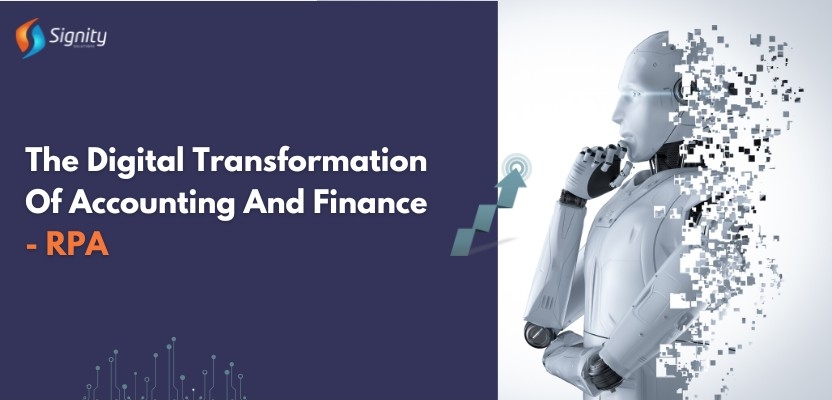None of us knows what tomorrow will bring, but we all have a responsibility to think about what’s going to happen, and prepare for it.
Accounting and finance landscape is no different, and here this means putting all the pieces of the puzzle together to leverage the advantage of the inevitable disruption ahead. This is likely not possible without a vision and strategy in today's digital world. So, this is the time to take a step back and assure your roadmap to that future is clear.
This is where Robotic Process Automation comes in the big picture.
Furthermore, according to an Economist Survey, “Advance of Automation”, 59% of finance and accounting mammoths adhere to the fact that Robotic Process Automation will provide them a competitive advantage in the next two years. Although the digitization of the finance and accounting industry has been underway for quite some time now, the global epidemic has acted as another upthrust to accelerate digital transformation efforts.
So, considering “digital transformation” as an unskippable aspect, RPA pave way for susetting clunky financial and accounting processes to add value and thrive the bottleneck competition. RPAs potential can be further extended with the add ons of Artificial Intelligence, that includes Machine Learning, optical character recognition or natural language processing for better management of the unstructured data.
For example, a global financial services company integrated RPA as an element of its digital transformation for automating their financial control tasks and processes. The results were amazing:
-
Minimized late posting by 99%
-
Accelerated period-end closing by 5 days
-
Same-day profit or loss delivery
Not to forget, 40% saving on operating costs along with the improvised ledger and reporting precisions.
Rightly said, “Digital transformation has radically transformed the playing field”. Let’s see how!
Strong Use Cases for RPA in Finance and Accounting Consist of:
Let’s have a look.
Record-To-Repeat
Different from humans, robots are specifically created to compare and reconcile voluminous data sets or identify exceptions with precision and speed. Processes like journal entities, intercompany accounting, period-close, GL reconciliations, management reporting, and variance analysis all come under the umbrella of ideal automation candidates.
Besides, it’s easier to train bots with regulatory and compliance activities or provide support for audits and taxes. So, in simple words, any rule-based decision-making process can be replicated in a bot’s instruction that can be executed with 100% accuracy every time the function is performed.
Data Consolidation and Management
Mainly companies use numerous applications to manage the organization.
Each application caters as a focal point of entry for new or revised data, which in some scenarios can create a headache for the business when applications are deficient in interoperability. To compound that, human errors choose rework processes and data management issues. Here, bots act as a boon and easily evaluate and consolidate data from several systems to enable better data management.
Order-To-Cash
There are numerous domains where robots can be utilized in Order-to-Cash, as the nature of the work itself is robotic. Besides, considering the human resources, this work is tedious and draining, often leading to inaccurate processing and costly rework.
As already known, bots are great at evaluating, comparing, and reconciling big data sets, structuring them into a logical component in master data management. However, bots can also be trained to process cash applications, run invoices and reports and even manage credit risks or disputes.
Source-To-Pay
Like other financial and accounting functions, bots can be used for payment processing, reconciliations, and running reports. Robots can also be trained to manage purchase orders and invoices.
Therefore, using the same systems as human employees, robots can input and reconcile data from system to system, manage vendor compliance, or even identify errors for manual review by human resources.
Financial Planning and Analysis
Considering the automation aspect, the financial planning and analysis process is broken into three categories:
-
Transactional
-
Analytical
-
Specialty
Transactional Processes:
Transactional processes like financial forecasts and regular budgets, processing eliminations, performing consolidations, and running frequent reports come under the robot's capabilities.
Analytical Functions:
Analytical functions like variance analysis compared to forecasts and budgets, evaluating and measuring cost drivers, tracking performance, and many other tasks that need more cognitive inputs can be automated, but the process is straightforward.
Here, Artificial Intelligence is used to help robots mimic some aspects of human decision-making, but this needs special guidance from human employees to train the robots overtime regularly.
Speciality:
Strategic functions or specialties like resource deployment and utilization, optimizing customer and product mix, or ongoing cost improvement management are not ideal choices for automation at this point.
The Benefits RPA Offer to Digitally Transform
Accounting & Finance
Most people associate automation with 24/7 reliability and availability, applicable for RPA. RPA bots for accounting automation don't need sick-offs. They provide high-quality service and deliver 100% accuracy and consistency. Here are some of the benefits of using RPA for accounting automation in enterprise-scale companies:
25-40% Saving
According to the Institute of Robotic Process Automation, RPA solutions help organizations save around 25-40% in labor costs and time. Besides, RPA bots handle repetitive tasks faster than humans, saving scarce resources.
Maximum Productivity
There’s no doubt a tremendous amount of time is spent gathering data and filling invoices. Unfortunately, these time-consuming tasks create bottlenecks and limit your accountant’s output.
So, you can adopt RPA for accounting automation to eliminate manual work from your workflow. Remember, RPA bots can complete tasks 20 minutes ahead of humans, increasing productivity organization-wide.
Minimized Errors
Accounting processes involve numerous steps and departments, from mid-sized enterprises to big organizations. As a result, minor human errors in each stage or department can accumulate, eventually paving the way for significant losses.
Therefore, using RPA, enterprise-scale companies can easily automate manual and error-prone accounting procedures to eliminate human errors from the equation.
Time Efficiency
According to Gartner, RPA can save finance departments and accounting teams from 25,000 hours of avoidable rework due to human errors.
So, including RPA for accounting automation effectively reduces time wastage and boosts operational efficiency. And, with RPA, your accountants will save effort and time from doing repetitive mundane tasks.
Nevertheless, you can redirect saved hours to revenue-generating activities, maximizing your company’s competitive advantage.
Compliance Is There Always
With an exceptionally growing business environment, it must ensure regulatory compliance.
Innovative RPA solutions minimize errors and create trails for each and every task, improving historical documentation and availability. So, adopting RPA for accounting automation can help enterprise-level companies ensure higher compliance with internal and external financial regulations.
Centralized Data
Imagine RPA robots as ERP-agnostic connective tissues between several systems. They interact with multiple data sources and consolidate precise information in a single location. And, with RPA, there’s no need to visit several systems or departments to find mission-crucial financial data.
Also, RPA benefits go beyond process automation to consist of psychological gains.
Of course, working on repetitive tasks for quite a long time is demoralizing. And using RPA solutions, you can easily automate mundane accounting tasks and boost your team’s morale. This technology also allows for constant improvisation.
So, incorporating RPA in your business helps you leverage your accountant’s knowledge and skills to enhance the capabilities of your RPA bots. You can create a Centre of Excellence (CoE) to acquire and send accounting best practices from skilled and experienced accountants into your integrated RPA solutions. This approach helps your organization optimize accounting processes for continuous improvements.
Finally…
RPA and other data-driven technologies are poised to free accountants from mundane tasks, not constraint them.
So, organizations that understand the potential and importance of Robotic Process Automation and invest in the right tools and training required to upscale their conventional financial and analysis processes are the forerunners to take full advantage - staying ahead of the curve.
After all, tomorrow’s accountants will play a more strategic and creative role in their organizations. And as a result, the business will not only leverage more efficient workflows and reap valuable insights from its accounting processes but also strengthen its own resiliency, agility, and competitive footing.



